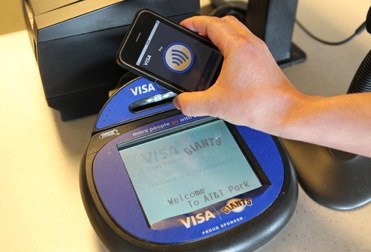At Mobile World Congress in Barcelona, Visa announced a new over-the-air provisioning service for smartphones for use with Visa’s payWave mobile payments system. The service will make it easier for operators, banks and even transit operators to link Visa payment accounts to consumers’ smartphones, the company says.
Although perhaps not as exciting as news of a mobile wallet “app” in consumers’ eyes, what Visa is revealing is a key part to the underlying infrastructure that can make NFC-based mobile payments a reality.
By allowing phones to be “switched on” for mobile payments through an over-the-air activation process, the process will become more seamless for users and service providers alike. However, because the system is NFC-based, it’s limited only to supported handsets which include an NFC chip. This is nowhere near the majority of smartphones today, and does not include the Apple iPhone. In addition, while there appears to be growing consumer demand for mobile payments, it’s not clear whether consumers will take to NFC in large numbers. (Only analysts’ predictions on that front.)
The new provisioning system was developed in hand with Oberthur Technologies, and allows for Visa’s payWave mobile payments technology as well as other payment applications to be deployed over the air to consumers’ NFC-equipped phones. NFC, or near field communication, is the short-range wireless communications technology that forms the backbone of several mobile payments initiatives, including the carrier-led Isis, as well as Google Wallet.
In practice, the provisioning system will include support for both Visa and non-Visa payment, loyalty and transit applications. That means that consumers could download mobile payment applications onto their phones – for example, a mass transit app for their city’s subway system – and then request their financial institution to activate mobile payments on their phone.
Visa’s provisioning system links to all the appropriate parties during this initial set up process, and handles the authentication of the user account (via a secure passcode), the exchange of secure “keys” to unlock the NFC chip installed on the smartphone (the chip that handles NFC-based transactions), the service activation and the download of the mobile payment account information.
For operators, the provisioning service makes it easier for them to make mobile payments available on mobile phones. Although, at first glance, it sounds like it could be a direct competitor to Isis, Visa’s Global Head of Mobile Product Bill Gajda told TechCrunch’s Leena Rao this past August that Visa is licensing its mobile payments application payWave for integration into the Isis wallet. In other words, the provisioning system is a backbone for mobile payment operations, not a new consumer-facing wallet product.
The only partner being announced at this time is Intel, which has agreed to support the the service on its new Intel Atom-based smartphones and tablets.
In a related announcement, Visa also says that it’s now working with European mobile operator Vodafone on the launch of an NFC-based mobile payments service which will begin with five countries in Western Europe (U.K., Germany, Spain, Turkey and the Netherlands). Initially, the service will involve pre-paid cards, but plans to support for other cards including those from banks, retailers, transit operators and more. The plan is to bring the service to the carrier’s 400-million customer base across the 30 countries where Vodafone now operates.
